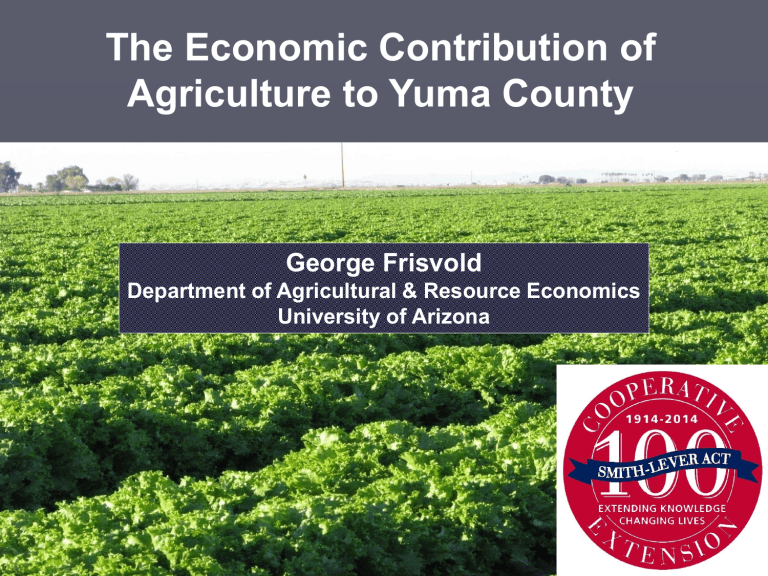The Economic Contribution of Agriculture to Yuma County George Frisvold

The Economic Contribution of
Agriculture to Yuma County
George Frisvold
Department of Agricultural & Resource Economics
University of Arizona
Yuma ranks highly among US counties in agricultural sales
Commodity
Vegetables & Melons
All Crops
All Agricultural Products
Other Crops & Hay
Nursery, Greenhouse
Grains, Oilseeds, Beans & Peas
Yuma’s rank among
US counties in sales
Top 0.1%
Top 0.5%
Top 1%
Top 1.2%
Top 23%
Top 28%
Yuma ranks highly among US counties in crop acreage
Commodity
Vegetables
Lettuce
Durum Wheat
Forage
Yuma’s rank among
US counties in acreage
Top 0.1%
Top 0.2%
Top 9%
Top 9%
AZ Cash Rents
($ / acre)
Yuma
La Paz
Maricopa
Pinal
Other Counties Average
Cochise
Graham
Pima
Mohave
Navajo
Greenlee
$584
$182
$157
$120
$118
$111
$108
$99
$98
$68
$60
Cash Rents: Yuma vs.
Colorado Basin States
Region
YUMA
SOUTHERN CALIFORNIA
CALIFORNIA
ARIZONA
NEVADA
NEW MEXICO
COLORADO
WYOMING
UTAH
$/acre
$ 584
$ 457
$ 365
$ 225
$ 155
$ 145
$ 125
$ 89
$ 82
Gross Cash Crop Receipts per Acre-
Foot of Water Withdrawn, 2010
COUNTY
Mohave County
La Paz County
Pinal County
Maricopa County
Pima County
Yuma County
$ / Acre Foot
$162.50
$190.22
$211.09
$368.70
$519.91
$680.81
Net Farm Income, 2012
Yuma
La Paz
Pinal
Maricopa
Pima
Cochise
Greenlee
Apache
Coconino
Navajo
Santa Cruz
Yavapai
Graham
Gila
Mohave
-$100,000 $0 $100,000 $200,000 $300,000 $400,000 $500,000 $600,000
25%
20%
15%
10%
5%
0%
Yuma Has High Labor Costs
Hired & Contract Labor as a % of Total Production Expenses
Yuma US Average
Economic Base Analysis
►
Local industries can be divided into “basic” and
“non-basic” sectors
►
Basic sectors
Produce for more than the local market
Bring money into local economy from outside
►
Non-basic sectors
Provide inputs & services for basic sectors
Provides goods & services for those employed in basic and other non-basic sectors
Location Quotients measure in industry’s relative importance
►
Location Quotient (LQ): a local industry’s share of local jobs relative to that industry’s share of total, national jobs
►
Industries with LQs > 1.25 usually considered part of a region’s economic base
►
LQs can identify national centers of certain types of production
Location Quotient (LQ) examples
►
Napa Wine & Spirit Merchant Wholesalers
LQ = 13.3
►
Silicon Valley Computer and Electronic
Product Manufacturing
LQ = 13.4
►
Detroit Motor Vehicle Manufacturing
LQ = 16.3
Combining crop, livestock & agricultural support sectors ...
►
… Combining sectors, Yuma’s LQ = 24.5
►
Yuma is to agriculture what …
Napa is to wine
Detroit is to cars
Silicon Valley is to computer technology
Yuma GDP?
►
US Bureau of Economic Analysis calculates a GDP
(Gross Domestic Product) for Yuma
►
Yuma’s GDP would rank 151 out of 192 countries
►
GDP is the monetary value of all finished goods and services produced within a region’s borders.
►
At state or local level, GDP is usually called “value added”
Yuma 2012 GDP
►
Nearly $5.4 billion
►
Private industries: $3.8 billion
►
Government: >$1.5 billion
►
Let’s look at agriculture in relation to other private industries . . .
Agriculture is the single largest private sector contributor to Yuma GDP (2012)
Agriculture & supporting services
Health care
Retail trade
Real estate
Manufacturing
Professional & scientific services
Construction
Wholesale trade
Accommodation and food services
Administrative services
Finance and insurance
Other services
Transportation & warehousing
Information
Utilities
Other
This does NOT include agricultural input industries or food processing industries
$ millions 0 100 200 300 400 500 600 700 800 900
Input-Output Model
►
Describes flows to and from industries and institutions in a local economy
►
Provide a “snapshot” of relationship between sectors in that economy
►
Is an accounting framework
State data must add up to national statistical totals
County data must add up to state statistical totals
Flow of all goods and services accounted for
What Are Economic Multipliers?
An initial change in spending has ripple effects throughout the economy
What Are Economic Multipliers?
Supplying new demands creates further new demand for inputs
Salaries and proprietors’ income are sources of demand for local goods and services
Three Input-Output Model Effects
►
Direct: Agricultural sectors
►
Indirect:
Triggered by changes in demand for production inputs
Main sectors will be production-oriented
►
Induced:
Income changes trigger changes in household demand
Main sectors will be consumer-oriented
2.8
2.4
2.0
1.6
1.2
0.8
0.4
0.0
Agricultural & Related Sectors
Contribute $2.8 Billion in Output
0.36
0.18
2.26
Induced Effect
Indirect Effect
Direct Effect
Output
1.5
Agricultural & Related Sectors
Contribute Nearly $1.5 Billion to
Value Added
1.25
0.22
0.10
1
0.75
1.16
Induced Effect
Indirect Effect
Direct Effect
0.5
0.25
0
Value Added
Contribution of Agricultural Sectors to
Yuma’s Economy: Employment
►
Direct Effect: 1 in 5 jobs
►
Total Effect: 1 in 4 jobs
Contribution to Employee Compensation and Business Owner Income
►
15% of County Employee Compensation
►
36% of Proprietor and Other Property
Income
Recap
►
Yuma is a unique, national center of agricultural production
►
Farm and related industries part of county’s economic base bringing injection of funds into the county from outside
►
Yuma is to agriculture what Silicon Valley is to computers and electronics
Economic Contribution of Agricultural
Sectors to Yuma County:
Total Effects
1 in 4 Jobs $2.8 Billion in Total
Output
$1.5 Billion in
Value Added
$34 Million in
State & Local
Taxes
Questions?
George Frisvold frisvold@ag.arizona.edu






